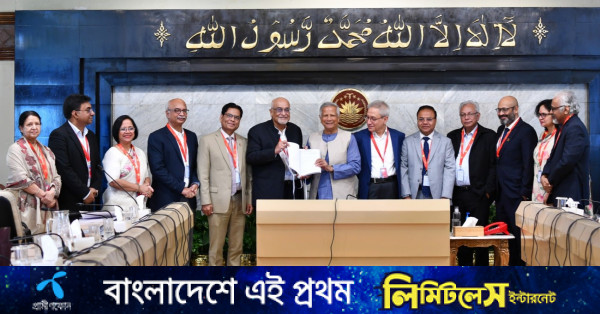“The problem is deeper than what we have thought,” Debapriya Bhattacharya said, adding that 30 chapters of the 400-page document will show how crony capitalism gave birth to the oligarchs, who controlled the policy framing
The committee members submit the White Paper on Bangladesh’s economy to Chief Adviser Dr Muhammad Yunus at his office in Tejgaon, Dhaka on Sunday, 1 December, 2024. Photo: Courtesy
“>

The committee members submit the White Paper on Bangladesh’s economy to Chief Adviser Dr Muhammad Yunus at his office in Tejgaon, Dhaka on Sunday, 1 December, 2024. Photo: Courtesy
An average of $16 billion was illicitly siphoned off from Bangladesh every year during former prime minister Sheikh Hasina’s corrupt autocracy, leaving the country in a state of plunder when she fled after a popular mass uprising, said a White Paper on the state of the economy during her rule.
The White Paper Committee today (1 December) submitted its report to Chief Adviser (CA) Professor Muhammad Yunus at his Tejgaon office in Dhaka, saying they were horrified by the level of corruption, plunder, and statistical manipulation conducted by Hasina’s regime, according to a statement posted on the CA’s official Facebook page.
Regarding revenue leakages and fiscal drainage, the committee in the final draft of the White Paper said systemic tax evasion, misuse of exemptions, and poorly managed public finances have deprived the state of critical resources, stalling development.
“Between 2009 and 2023, illicit financial outflows averaged USD 16 billion annually—more than double the combined value of net foreign aid and FDI inflows,” it said.
Moreover, halving tax exemptions could double education funding and triple health allocations, underscoring the significant fiscal opportunities lost to corruption, read the paper.
Debapriya Bhattacharya, a top economist and the distinguished fellow of the Dhaka-based think tank Centre for Policy Dialogue (CPD), headed the committee. He led his team at the handover ceremony.
CA Yunus thanked the committee for doing a landmark, saying it should be published once it is finalised and be taught in textbooks in national college and university curricula.
“This is a historic document. It will show us the economy we inherited after the July-August mass uprising. The nation will benefit from this document,” said the chief adviser in his short speech before receiving the White Paper.
“Our blood curdles to know how they plundered the economy. The sad part is they looted the economy openly. And most of us could not summon courage to confront it,” he said.
Even the multilateral agencies that monitor Bangladesh’s economy were also largely silent when this plunder took place, he said.
Head of the committee, Debapriya Bhattacharya, said they worked independently without any interference from the government.
“The problem is deeper than what we have thought,” he said, adding that the 30-chapter and 400-page long White Paper will show how crony capitalism gave birth to the oligarchs, who controlled the policy framing.
Committee member Mustafizur Rahman said they examined seven large projects out of 29 projects with over Tk10,000 crore expenditure outlay for each. The total expenses on 29 large projects were $87 billion, or Tk7,80,000 crore.
The estimated initial cost of the seven projects examined was Tk1,14,000 crore. The project costs were later revised to Tk1,95,000 crore by adding many components, showing an inflated land price, and manipulating the purchase.
The project costs were raised almost 70% without analysing the cost benefit, he said.
He also suggested the start of special prosecution to try people who were involved in money laundering.
Committee member AK Enamul Haque said in the last 15 years over Tk7,00,000 crore was spent on the Annual Development Programme (ADP), and 40% of the money was plundered by bureaucrats.
Committee member Mohammad Abu Eusuf revealed that the amount of tax exemption during the past regime was 6% of the total GDP of the country.
If it could be reduced to half, the education budget could be doubled and the health budget could be tripled, he said.
M Tamim, another member of the committee, said $30 billion was invested on power generation, and if the kickback was considered 10%, the amount would be at least $3 billion.
Finance Adviser Salehuddin Ahmed, Bangladesh Bank Governor Ahsan H Mansur, Principal Secretary Sirajuddin Sathi, and Senior Secretary Lamiya Morshed were also present at the handover ceremony.
The report titled ‘Dissection of a Development Narrative’ is expected to be made available for the public soon.


